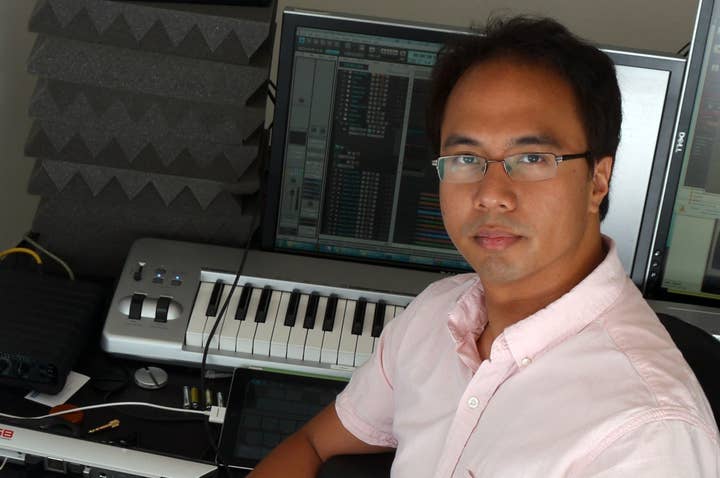"My love is for games and game music, not the music by itself"
Thatgamecompany's Vincent Diamante on the importance of sound design
The first game that Vincent Diamante wrote the soundtrack for was Dyadin. You might not have heard of it, but it went on to be selected as a winner of the student showcase at the 2005 Independent Game Festival. His fellow USC classmates and co-developers on the game also included Jenova Chen and Rick Nelson, who he would be reunited with at thatgamecompany. Out of that partnership would come games like Flower and Journey.
Vincent has now been involved in the games industry as a composer and sound designer for a decade. His work has earned him a BAFTA nomination and the reissue of Flower is currently the top rated PlayStation 4 game on Metacritic.
Although his official title is audio director, it quickly becomes clear when talking to Vincent that this title does not fully give him credit for the contribution he makes to the games he works on: Diamante's is a broader discipline. He says that his biggest contribution on Dyadin was probably in level design, which may seem surprising; but makes more sense when you understand that he considers game design and game audio not to be separate, but one and the same.
Whereas other composers may sit in a separate room from the game's designers, or even work from a different geographic location, for Vincent this is not the case. "Being with the other designers and working on the levels really helped to inform the sound" he explains. "I understand how long it took for the player to get from one end of the level to the other or how dense the enemy crowds would be as you played through the game, and so I had a much better idea of which type of sound or music would be required".
"My love is for games and game music, not the music by itself, so I feel a little split about the current state of music and games"
For Vincent then, the creation of game audio starts with a deep understanding of the game itself - from both a level design viewpoint and the individual game mechanics. "It's one thing to have a narrative sheet in front of you saying that the music has to be emotional at this part and it has to be high intensity at that part, and it's another thing to know really innately that in Journey, for example, that the player's jump has a certain weight or heft to it and that informs the music and sound in a real and substantial way".
Seeing game design and game audio as inseparable can cause Vincent to become frustrated sometimes. While having remarkable sound design and music is desirable, it's often the case that they are not particularly integrated with the game itself. "My love is for games and game music, not the music by itself, so I feel a little split about the current state of music and games".
This passion for the tight integration of game design and game audio is perfectly demonstrated in Flower, the game for which he received his BAFTA nomination. Here the music and the sound design are intertwined, the music has its themes, tempo, and key signature, and the sound engine can instruct the flowers to play so that can feel like a guitar strum on top of the original piece of music, or maybe even a distinct melody alongside the music that is playing at that time. And of course it's not just the interaction between the music and sound design that is important, a lot of this control is in the player's hands.

"This is why having an understanding of the player and what they would like to do in the level, the spacing of the flowers, the speed with which players can traverse particular environments, all of these things come together to not only inform the sound experience, but the overall experience for the player, and having all of these things inform each other was essential for the development".
Flower might seem to be loosely arranged, almost procedurally generated, but Vincent adds that the positions of the flowers were adjusted based on playtesting results, "I did care a lot about the position of the flowers," he says. "In order to get the right sound, in order to match the music in just the right way."
It's no coincidence that Vincent is a pioneer in interactive audio, as he holds a B.M. in Electroacoustic Media from USC's Thornton School of Music and an M.F.A. in Interactive Media from USC's School of Cinematic Arts. This technical background covers modern music, sound design, programming and synth design among many other topics, but at the very base he says it's all about interactivity and the potential for interactivity. One particular lesson that he took with him from his educational background at USC into the video games space was the concept of player centric design - the exploration of systems which can create emotions and ideas within the player.
Although we do know that Vincent is working on an unannounced title from thatgamecompany, he can't say much about it other than he's excited about what they are doing with interactive music. He says that although musicians are familiar with different instrument capabilities and musical genres, interactive audio is often overlooked by many musicians as a potential asset in their toolbox.
"That idea of starting with game design and being so close to the game before writing music or designing sound is really essential"
There are many different types of interactive music - horizontal, vertical, branching, and these can be combined with varying effects and layers in different ways to communicate to the player. "So when it comes to music, I've got a lot of power in my hands and I want to reveal to the player a really interesting music system that gives them a different understanding of the relationship between everything that's going on in the game world".
Vincent's background, passions, and process make him unique. For him, game design not only informs musical composition and sound design, but is also the basis for the complex interactive system between the game, audio, and player experience. In other words, audio design and composition is just as key to the development process as any other part of the discipline.
"Although a lot of things have changed over the years," he concludes, "that idea of starting with game design and being so close to the game before writing music or designing sound is really essential."
Vincent was speaking at the Edinburgh Game Symposium, which took place on June 27 & 28, 2014.

